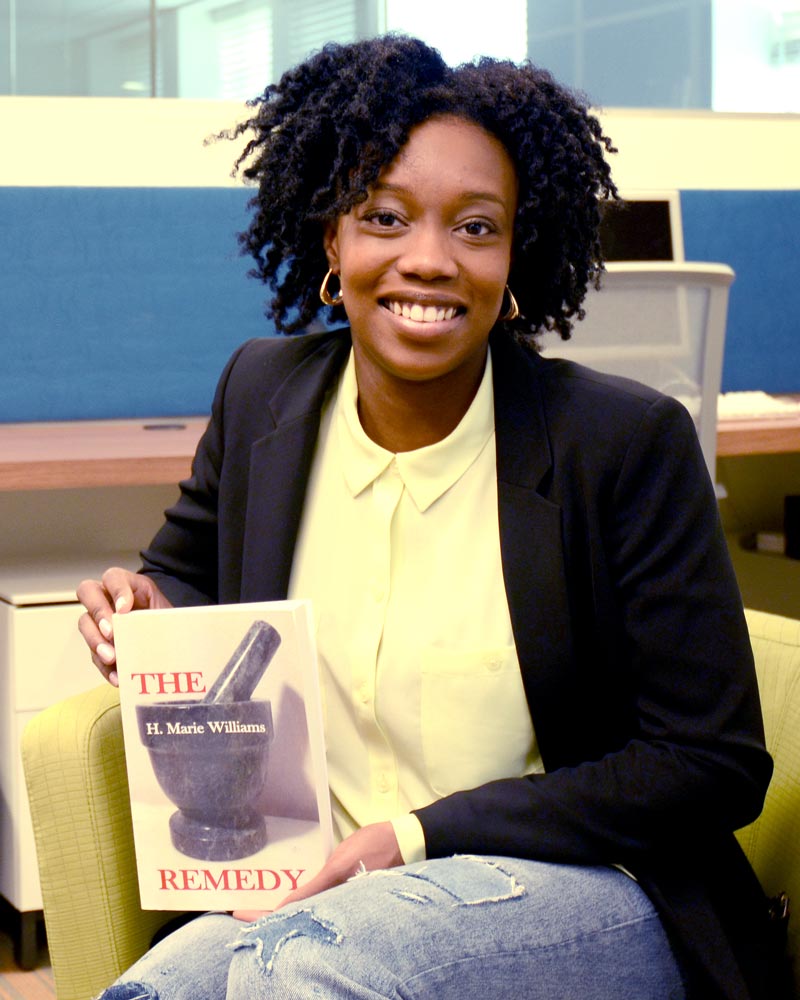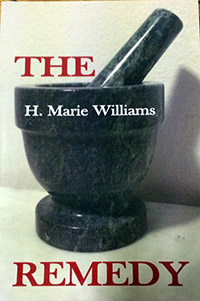The Remedy
Alumna publishes memoir about surviving sexual assault
H. Marie Williams (Educ '06) recently published a memoir about overcoming the trauma of sexual assault. The Remedy includes chapters about Williams' time as a student at UVA, where she arrived just after she was assaulted. She talked to Virginia Magazine about her book and her hopes for improving awareness about sexual assault survivors on Grounds.

What motivated you to write this book?
It was the book I needed to read and could not find because it had not yet been written. I thought about girls whose only knowledge of manhood is routinely misrepresented by a sexually abusive father or stepfather. Realizing how fortunate I was to have grown up with positive male role models left me with a very real sense of social responsibility. If I lost hope, with my spirituality, strong familial ties, positive male figures and education, what happens to girls who are less fortunate than me?It became clear that I did not survive everything I’d experienced to retreat into the same silence that almost claimed my life. I knew I was to be the living sacrifice victims around the world needed. This book is that sacrifice.
The narrative is told in two voices, two personalities, one talking to the other. Can you talk about this choice?Duality, clinical psychologists term for the phenomenon, occurs as a result of shock and the need to dissociate from the trauma. Because duality, accompanying post-traumatic stress disorder is not uncommon in sexual assault victims, the choice to emphasize duality was not a choice. It was my only option because it was the one reality I knew. This was the way every day sounded in my head for years, and is representative of the thoughts of victims everywhere.
You came to UVA soon after being raped. Did you find support here?Support becomes a distorted word when talking about recovery. I do not believe I received adequate support when I arrived at UVA. While the staff had good intentions, I believe the understanding of victims’ needs and the true meaning of victim advocacy eluded the university community at that time. I remember asking about group therapy in 2003 and being informed that it was not an available option. Just last month I learned that the Women’s Center will begin offering that option for survivors and I could not be more pleased. It is very difficult for survivors to discuss their experiences, and I genuinely believe being able to listen will transform their lives in a way I only dreamed of during my time on Grounds.
How did you overcome what happened to you?Overcoming is an ongoing process. The public can close the newspaper, turn off the television and place their tablets on standby when they have had their fill of news and current events. A survivor cannot just power down at the end of the night or power up with every sunrise. I have spent thousands of hours reading about love in Bible scriptures, quotes, poems and short stories. I spent years praying for the strength to love unconditionally. My family, and a safe, stable environment also played a huge role in my recovery.
What advice would you give to the UVA community as it focuses on the issue of sexual assault on Grounds?
My advice to the community as a whole is to educate itself on where the jurisdiction of University officials begin and end. Read the Rape and Sexual Assault paper by the White House’s Council on Women and Girls and be prepared to challenge any delays in policy implementation and demand forward movement.
My advice to the men in the UVA community is to use your gender to aid with advocacy. Living in a frat house with the members of Alpha Phi Alpha Fraternity, Inc. is what prevented me from further suicide attempts while on Grounds. Ask yourselves and other Cavalier gentlemen to rise to the challenge of staying informed, setting a standard of manhood that requires prudence and good manners and having the audacity and courage to call out all of your counterparts whose behavior puts your good name as a Cavalier in question.
My advice to the administrators at UVA is to continue to encourage young women to report offenses so that accurate numbers of incidence can be produced. It is very difficult to kill a beast with whose nature you are unfamiliar. I would encourage administrators to require every incoming student, first-year or not, to take a mandatory pass/fail education course covering all aspects of sexual misconduct, advocacy and reporting. I also believe a one day refresher at the start of every year would benefit the community.
For more information on H. Marie Williams and her book, visit her Facebook page.

Read an excerpt from H. Marie Williams' The Remedy below:
Covering a few early shifts one week for our daytime bartender Debbie, I decided to stay for the Wednesday happy hour. Just before it was in full swing, Edmund came in. I knew he’d be having a Glenlivet, and I was relieved to see him. Our conversations were always mentally stimulating, and he was one of my favorite patrons—well-dressed, respectful to a fault and always offering words of wisdom and encouragement as it pertained to my career aspirations.
Edmund sat down next to me at the bar after giving me one of those one-armed hugs, that don’t really allow the huggers bodies to come in contact with each other.
“So, when are you going to tell me more about this book you’re writing? I want to hear about it. Seriously.” He was so earnest.
“I haven’t written very much. I keep getting stuck, not because I have nothing to say, but because I honestly just cannot say it.” It was an issue I had never met with writing in the past. Everything always seemed to describe itself for me naturally.
Should I admit that I was really just unable to face the feelings of depression that would begin to manifest every time I tried to recount what had happened? I knew the anxiety was because I wanted it to be true. The only way I knew to keep it true was to relive the event, intentionally drawing details and specifics from my memory. Every time I’d sit at my desk in the mood to write, I’d step away from a blank screen 20 minutes later in search of wine. A two hour bout always left me with a tear-stained keyboard, an empty wine bottle and a very real fear of facing my past.
Edmund sat patiently, attentively waiting for me to share details about the book.
“Writer’s block is natural. What is it about? Who’s your publisher? Why are you writing it? Do you have an illustrator for the cover design? You know my wife’s an artist.” He waited for the answers. What was I supposed to say?
“It’s about an event in my life and all the subsequent interactions and situations I found myself in as direct results of the first; the book chronicles how everything affected me. I write it as I lived it, in constant conflict and turmoil. And at the end I really just want the two conflicting parts of me to be whole, but it’s really hard to get them to come together because they really aren’t together now. I’m not sure if they will ever be.”
Edmund paused. Puzzled, he asked, “What are they in conflict over?” I let the question hang in the air for a second while I gathered myself.
“Rape. While my leg was broken I was raped, and half of me kept trying to fight and push on, while the other half felt dirty, guilty and worthless. They just don’t get along very well anymore, and I never knew two sides existed until then. I can’t figure out how to bring them together the way they were before it happened…” Rambling, I peered into the soul of my gimlet, ashamed.
Edmund cut me off. “Hannah, I am sorry you had to go through that. I am, but the truth is, not every story has an ending. The book can stop wherever you want or need it to, but the story may never end. Understand?”
“Yes, I know but I...” I started, averting my eyes to the scratches on the bar. I couldn’t look at him anymore; I felt transparent, vulnerable and ashamed. He wasn’t finished.
“Understand that you are alive, and that will be enough for every reader to know the story hasn’t ended. They don’t need to know if you ever accepted both halves or ever “fixed” everything. All they need to know is what you wanted to know from the beginning: Are you the only one going through this, experiencing these thoughts? Putting yourself in these situations? Are you wrong or crazy? And I can answer that. You aren’t wrong. You do know that right?!”
I was in no position to look at him. He repeated the question, and this time he expected an answer, so I looked him in the eye.
Edmund was an older gentleman—late 40s or early 50s I’d estimate—tall and lean. He’d played basketball at the University of Pittsburgh. His position at MasterCard required that he travel frequently, and he was what I am certain most women would call very handsome. I’d always thought so, and in that instant, rather than feelings of insecurity and shame, his question exposed my grief.
“I know,” I whispered, immediately looking back down at the bar. I began to feel Joel’s hands all over my body again, and my face started to tingle in the spot his hand had once connected. I wanted to run again. I was about to, but Edmund broke the silence.